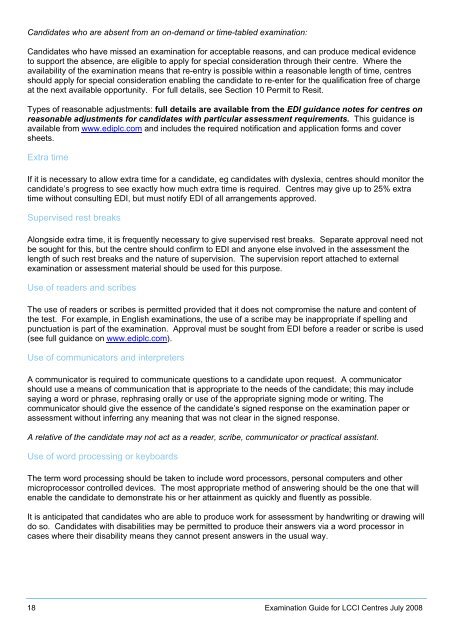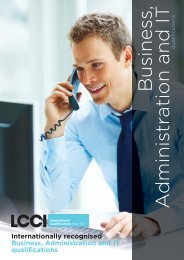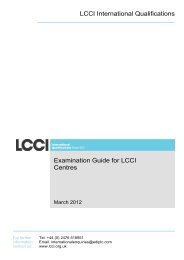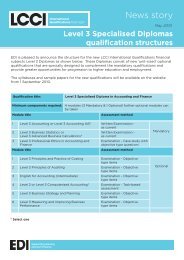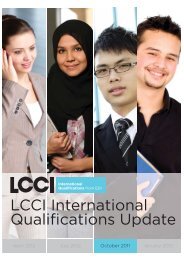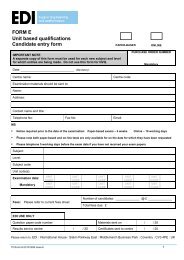LCCI International Qualifications Examination Guide for LCCI Centres
LCCI International Qualifications Examination Guide for LCCI Centres
LCCI International Qualifications Examination Guide for LCCI Centres
Create successful ePaper yourself
Turn your PDF publications into a flip-book with our unique Google optimized e-Paper software.
Candidates who are absent from an on-demand or time-tabled examination:Candidates who have missed an examination <strong>for</strong> acceptable reasons, and can produce medical evidenceto support the absence, are eligible to apply <strong>for</strong> special consideration through their centre. Where theavailability of the examination means that re-entry is possible within a reasonable length of time, centresshould apply <strong>for</strong> special consideration enabling the candidate to re-enter <strong>for</strong> the qualification free of chargeat the next available opportunity. For full details, see Section 10 Permit to Resit.Types of reasonable adjustments: full details are available from the EDI guidance notes <strong>for</strong> centres onreasonable adjustments <strong>for</strong> candidates with particular assessment requirements. This guidance isavailable from www.ediplc.com and includes the required notification and application <strong>for</strong>ms and coversheets.Extra timeIf it is necessary to allow extra time <strong>for</strong> a candidate, eg candidates with dyslexia, centres should monitor thecandidate’s progress to see exactly how much extra time is required. <strong>Centres</strong> may give up to 25% extratime without consulting EDI, but must notify EDI of all arrangements approved.Supervised rest breaksAlongside extra time, it is frequently necessary to give supervised rest breaks. Separate approval need notbe sought <strong>for</strong> this, but the centre should confirm to EDI and anyone else involved in the assessment thelength of such rest breaks and the nature of supervision. The supervision report attached to externalexamination or assessment material should be used <strong>for</strong> this purpose.Use of readers and scribesThe use of readers or scribes is permitted provided that it does not compromise the nature and content ofthe test. For example, in English examinations, the use of a scribe may be inappropriate if spelling andpunctuation is part of the examination. Approval must be sought from EDI be<strong>for</strong>e a reader or scribe is used(see full guidance on www.ediplc.com).Use of communicators and interpretersA communicator is required to communicate questions to a candidate upon request. A communicatorshould use a means of communication that is appropriate to the needs of the candidate; this may includesaying a word or phrase, rephrasing orally or use of the appropriate signing mode or writing. Thecommunicator should give the essence of the candidate’s signed response on the examination paper orassessment without inferring any meaning that was not clear in the signed response.A relative of the candidate may not act as a reader, scribe, communicator or practical assistant.Use of word processing or keyboardsThe term word processing should be taken to include word processors, personal computers and othermicroprocessor controlled devices. The most appropriate method of answering should be the one that willenable the candidate to demonstrate his or her attainment as quickly and fluently as possible.It is anticipated that candidates who are able to produce work <strong>for</strong> assessment by handwriting or drawing willdo so. Candidates with disabilities may be permitted to produce their answers via a word processor incases where their disability means they cannot present answers in the usual way.18 <strong>Examination</strong> <strong>Guide</strong> <strong>for</strong> <strong>LCCI</strong> <strong>Centres</strong> July 2008


